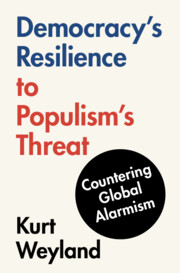130 results
6 - Right-Wing Populism in the USA
-
- Book:
- Democracy's Resilience to Populism's Threat
- Published online:
- 11 January 2024
- Print publication:
- 25 January 2024, pp 196-226
-
- Chapter
- Export citation
7 - Conclusion
-
- Book:
- Democracy's Resilience to Populism's Threat
- Published online:
- 11 January 2024
- Print publication:
- 25 January 2024, pp 227-260
-
- Chapter
- Export citation
1 - The Populist Threat to Democracy
-
- Book:
- Democracy's Resilience to Populism's Threat
- Published online:
- 11 January 2024
- Print publication:
- 25 January 2024, pp 1-29
-
- Chapter
- Export citation
5 - Right-Wing and Traditionalist Populism in Europe
-
- Book:
- Democracy's Resilience to Populism's Threat
- Published online:
- 11 January 2024
- Print publication:
- 25 January 2024, pp 159-195
-
- Chapter
- Export citation
References
-
- Book:
- Democracy's Resilience to Populism's Threat
- Published online:
- 11 January 2024
- Print publication:
- 25 January 2024, pp 261-300
-
- Chapter
- Export citation
Contents
-
- Book:
- Democracy's Resilience to Populism's Threat
- Published online:
- 11 January 2024
- Print publication:
- 25 January 2024, pp v-vi
-
- Chapter
- Export citation
Copyright page
-
- Book:
- Democracy's Resilience to Populism's Threat
- Published online:
- 11 January 2024
- Print publication:
- 25 January 2024, pp iv-iv
-
- Chapter
- Export citation
Index
-
- Book:
- Democracy's Resilience to Populism's Threat
- Published online:
- 11 January 2024
- Print publication:
- 25 January 2024, pp 301-312
-
- Chapter
- Export citation
3 - Neoliberal and Right-Wing Populism in Latin America
-
- Book:
- Democracy's Resilience to Populism's Threat
- Published online:
- 11 January 2024
- Print publication:
- 25 January 2024, pp 74-116
-
- Chapter
- Export citation
Acknowledgments
-
- Book:
- Democracy's Resilience to Populism's Threat
- Published online:
- 11 January 2024
- Print publication:
- 25 January 2024, pp ix-x
-
- Chapter
- Export citation
2 - How Institutional Constraints and Conjunctural Opportunities Condition Populism’s Threat to Democracy
-
- Book:
- Democracy's Resilience to Populism's Threat
- Published online:
- 11 January 2024
- Print publication:
- 25 January 2024, pp 30-73
-
- Chapter
- Export citation
Tables
-
- Book:
- Democracy's Resilience to Populism's Threat
- Published online:
- 11 January 2024
- Print publication:
- 25 January 2024, pp vii-viii
-
- Chapter
- Export citation
4 - “Bolivarian” and Left-Wing Populism in Latin America
-
- Book:
- Democracy's Resilience to Populism's Threat
- Published online:
- 11 January 2024
- Print publication:
- 25 January 2024, pp 117-158
-
- Chapter
- Export citation

Democracy's Resilience to Populism's Threat
- Countering Global Alarmism
-
- Published online:
- 11 January 2024
- Print publication:
- 25 January 2024
“Growth With Equity” in Chile's New Democracy?
-
- Journal:
- Latin American Research Review / Volume 32 / Issue 1 / 1997
- Published online by Cambridge University Press:
- 05 October 2022, pp. 37-68
-
- Article
-
- You have access
- Export citation
Development, Democracy, and Inequity: New Contributions on the Brazilian Political Economy
-
- Journal:
- Latin American Research Review / Volume 31 / Issue 3 / 1996
- Published online by Cambridge University Press:
- 05 October 2022, pp. 189-202
-
- Article
-
- You have access
- Export citation
Assessing Latin American Neoliberalism: Introduction to a Debate
-
- Journal:
- Latin American Research Review / Volume 39 / Issue 3 / 2004
- Published online by Cambridge University Press:
- 05 October 2022, pp. 143-149
-
- Article
-
- You have access
- Export citation
The Political Economy of Market Reform and a Revival of Structuralism
-
- Journal:
- Latin American Research Review / Volume 42 / Issue 3 / October 2007
- Published online by Cambridge University Press:
- 05 September 2022, pp. 235-250
-
- Article
-
- You have access
- Export citation
The Populist Challenge to U.S. Democracy: Renewing American Political Development's Comparative Perspective
-
- Journal:
- Studies in American Political Development / Volume 36 / Issue 2 / October 2022
- Published online by Cambridge University Press:
- 31 May 2022, pp. 141-143
-
- Article
-
- You have access
- Open access
- HTML
- Export citation
Why US Democracy Trumps Populism: Comparative Lessons Reconsidered
-
- Journal:
- PS: Political Science & Politics / Volume 55 / Issue 3 / July 2022
- Published online by Cambridge University Press:
- 06 December 2021, pp. 478-483
- Print publication:
- July 2022
-
- Article
-
- You have access
- Open access
- HTML
- Export citation



